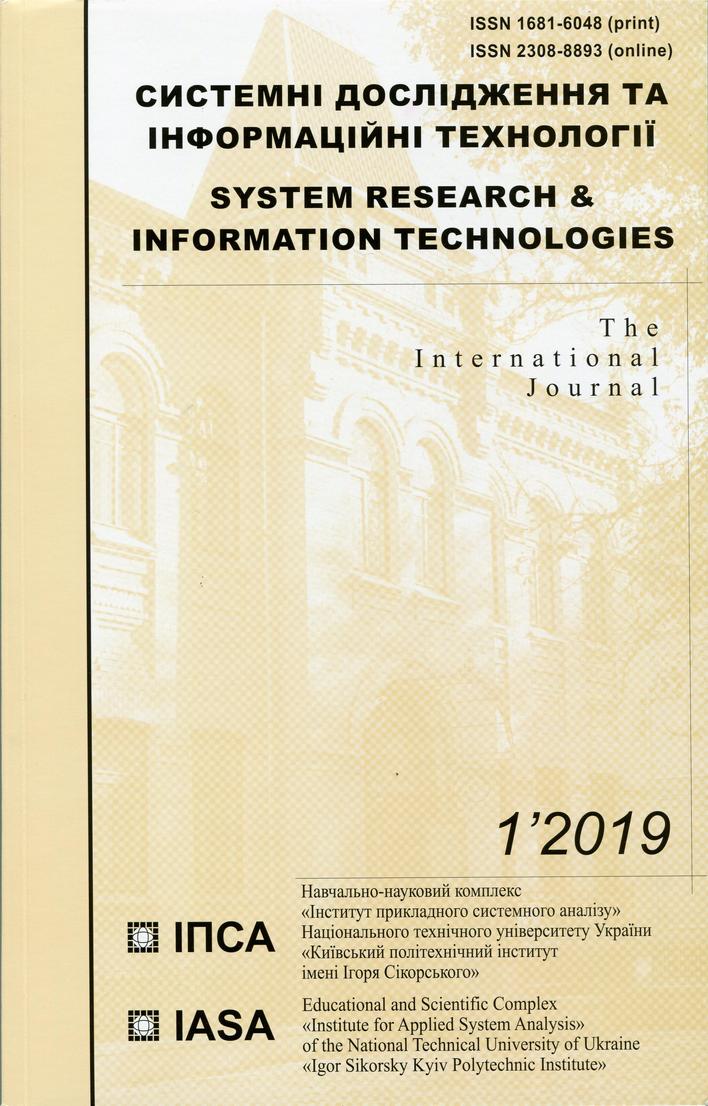Assessment of human adaptive reserves by pulse wave
DOI:
https://doi.org/10.20535/SRIT.2308-8893.2019.1.08Keywords:
diagnostics, functional state, pulse wave, biological age, form indexAbstract
The definition of adaptive reserves of human health is one of the diagnostic tasks and is aimed at obtaining a quantitative assessment of the functional state of the main systems in the process of health and the appearance of pathologies. The article studies and describes the architecture of the system. A software-hardware system for recording and processing pulse wave data is shown. The proposed quantitative criterion for assessing the functional state of the cardiovascular system is the pulse waveform index (PWI), while using the forward and inverse Fourier transform and analyzing its characteristics. Dynamic properties of a pulse wave in a state of rest are investigated. The results of the study by calculating PWI for groups of volunteers of different age and sex are presented. The proposed quantitative criterion R for estimating the adaptive reserves of the subjects is derived by training the neural network with back propagation of the error. The norms for R are presented that take into account person's age and sex. The estimation of this method, as well as the results of statistical processing of input data are carried out. The capabilities of the developed software and hardware system were analyzed, the proposals for improving both hardware and software were made.References
Zaporozhko I.A. Pletthismography analysis according to age and genders / I.A. Zaporozhko, V.I. Zubchuk, E.A. Nastenko // Proceedings of 7th Annual Conference “Science and Art for Advancement in Medicine”, March 30–April 1, 2012. — Budapest, Hungary.
Pul'sovaja diagnostika tibetskoj meditsiny / Otv. red. Ch.Ts. Tsydypov. — Novosibirsk: Nauka, 1988. — 133 s.
Kordo I. Einaus Datender Blutzirkulation Kalkulierter Index zur Beurteilung der Vegetativen Tonuslage / I. Kordo // Actaneyrovegetativa. — 1966. — Bd. 29. — N 2. — P. 250–268.
Amosov N.M. Moja sistema zdorov'ja / N.M. Amosov. — K.: Zdorov’ja, 1977. — 56 s.
Arinchin N.I. Mikronasosnaja dejatel'nost' skeletnyh myshts pri ih rastjazhenii / N.I. Arinchin, G.F. Borisevich. — Mn.: Nauka i tehnika, 1986. — 112 s.
Zubchuk V.I. Informatsionnoe obespechenie pul'sodiagnostiki / V.I. Zubchuk, M. Delavar-Kasmai, V.A. Kreschuk // Elektronika i svjaz'. Tematicheskij vypusk "Problemy elektroniki". — 2005. — Ch. 2. — S. 120–124.
Ivanov S.Ju. Tochnost' izmerenija arterial'nogo davlenija po tonam Korotkova v sravnenii s ostsillometricheskim metodom / S.Ju. Ivanov, N.I. Livshits // Vestnik aritmologii. — 2005. — № 40. — S. 55–58.
Mal'ovanyk N.H. Perelik funktsional'nykh prob v kardiolohiyi dlja rann'oyi diahnostyky ta monitorynhu perebihu sertsevo-sudynnykh zakhvorjuvan' / N.H. Mal'ovanyk. — Uzhhorod, 2010.
Nastenko E.A. Analiz sostojanija sistemy krovoobraschenija i mikrotsirkuljatornogo rusla na osnove funktsional'nyh pokazatelej / E.A. Nastenko, E.K. Nosovets, S.V. Zubkov // Zhurnal "Biomedychna inzhenerija". — 2011. — № 2. — S. 2–48.
Nejronnye seti v sisteme pul'sovoj diagnostiki / V.I. Zubchuk, V.P. Jatsenko, M. Delavar-Kasmai i dr. // Elektronika i svjaz'. Tematicheskij vypusk "Problemy elektroniki". — 2007. — Ch. 3. — S. 58–61.

